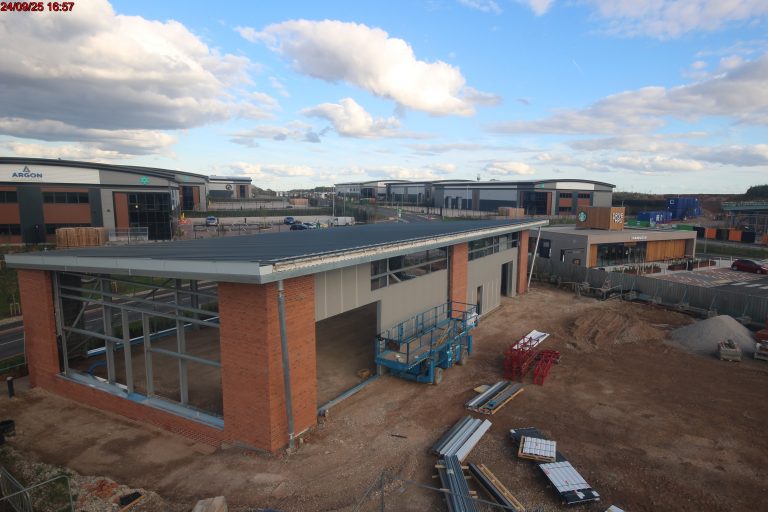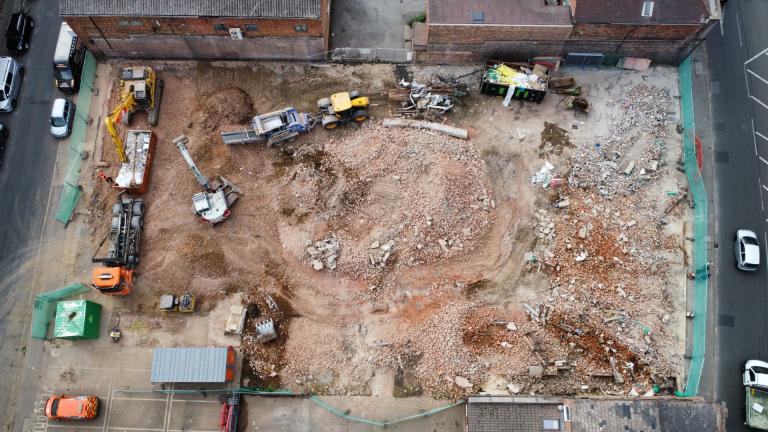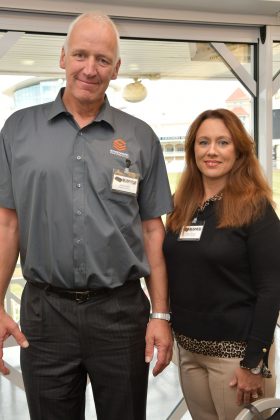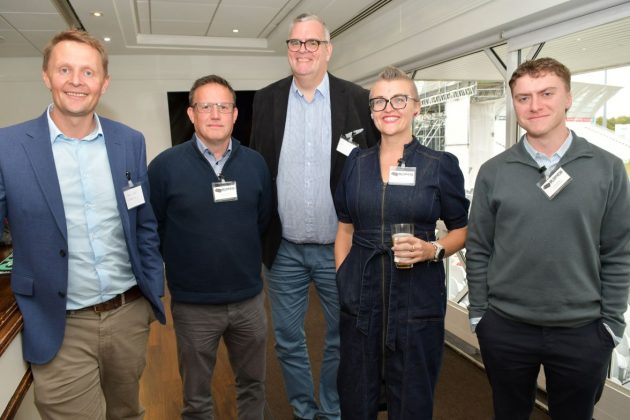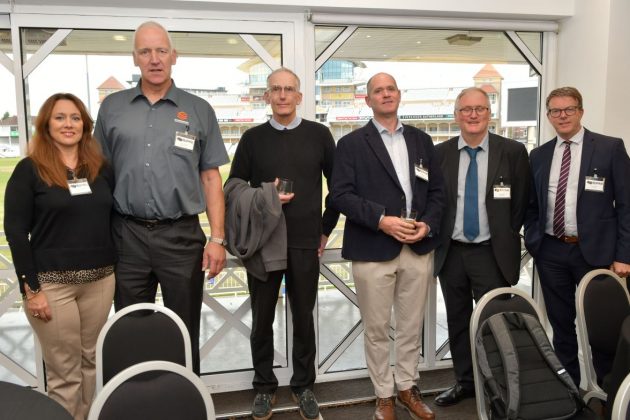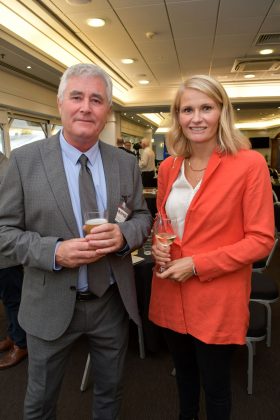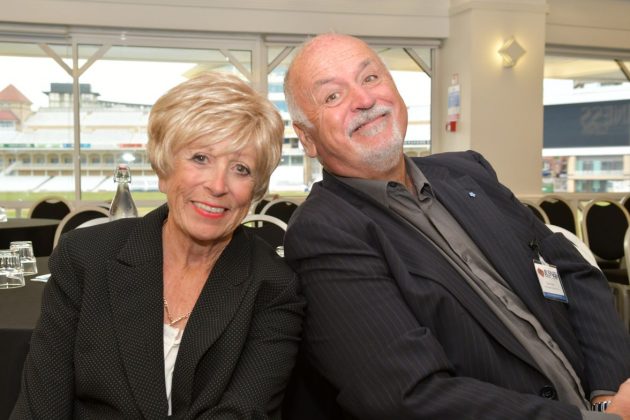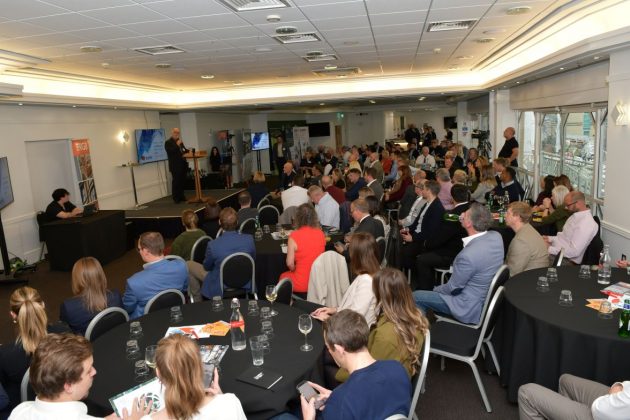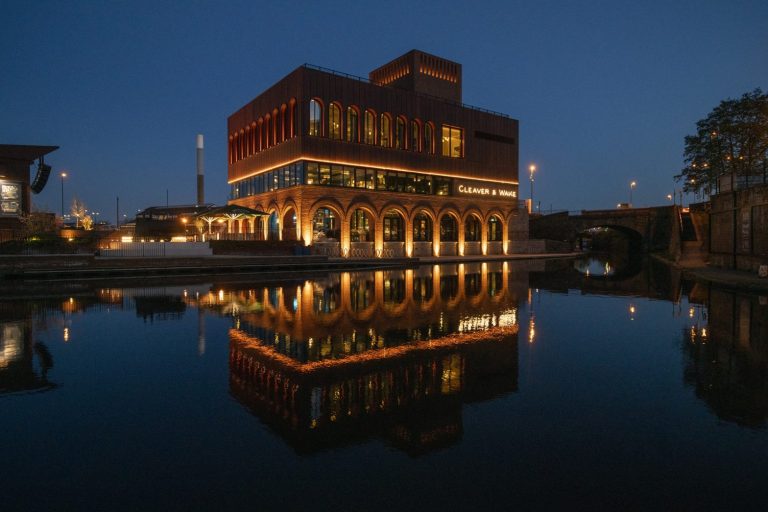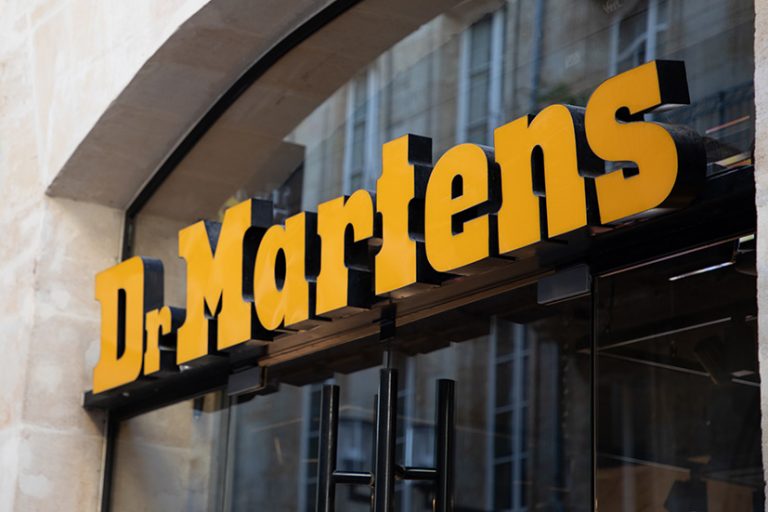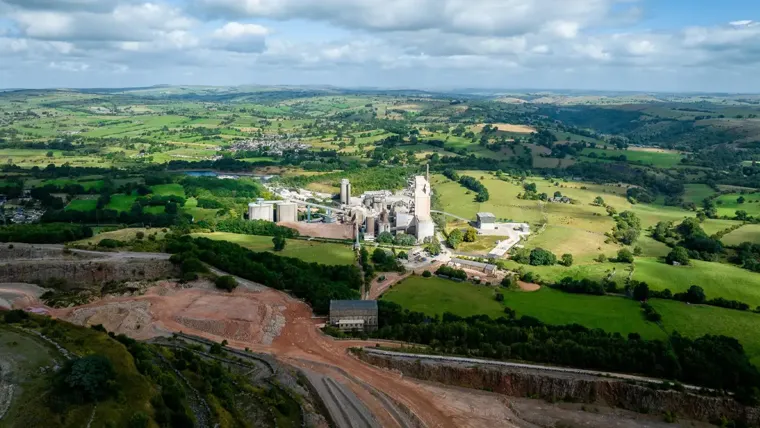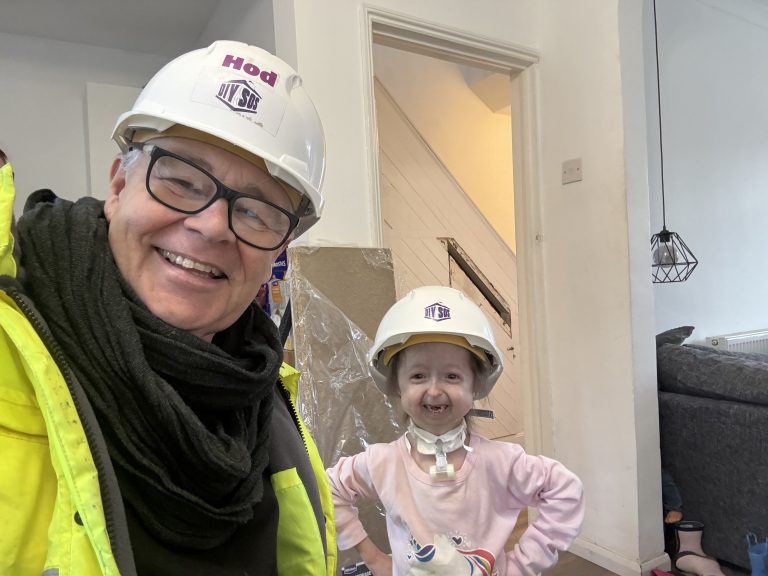1284 Communications appoints content director
Clowes Developments drives forward roadside trade counter units at Castle Donington business park
Demolition work completes on derelict Long Eaton cinema
Work begins to build new industrial site in Staveley
Richard Kenyon to lead Nottinghamshire County Cricket Club
Nottinghamshire County Cricket Club has appointed Richard Kenyon as its new Chief Executive, with his tenure set to begin in December.
Kenyon brings extensive leadership experience from his time at Everton Football Club, where he held senior roles including Chief Commercial & Communications Officer and Chief Executive of Everton in the Community. His background includes overseeing large-scale projects such as the development of Everton’s new stadium at Bramley-Moore Dock and driving commercial and brand growth initiatives.
“Throughout his career, Richard has demonstrated the ability to lead large, complex organisations through significant transformation while maintaining a strong focus on values, governance, and performance,” said Nottinghamshire Chair Andy Hunt. “His leadership at Everton spanned critical areas including commercial strategy, global brand development, major infrastructure projects, and multi-stakeholder consultation – all directly relevant to the current and future ambitions of our Club.”
Kenyon’s appointment follows the departure of former Chief Executive Lisa Pursehouse. The club is entering a key phase marked by its 2025 County Championship victory, the integration of a tier-one women’s professional team, and ongoing redevelopment work at the historic Trent Bridge Pavilion. Nottinghamshire has also maintained a majority stake in the Trent Rockets.
Until Kenyon’s arrival, Commercial Director Michael Temple will serve as Interim Chief Executive. The appointment marks a strategic move to strengthen the club’s leadership during a period of transformation across English cricket.
Former Derby police station set for major residential conversion
The former police station on Cotton Lane in Derby is set to be redeveloped into 102 apartments following approval by Derby City Council’s planning committee.
The application, submitted by DCG Investments Ltd, includes 55 one-bedroom and 47 two-bedroom units. Plans also feature 51 on-site parking spaces and 120 cycle spaces.
The building, vacated by Derbyshire Police in 2022 when operations moved to the new Ascot Drive station, has been unused since and described as being in poor condition. It was closed originally in 2017 after being deemed no longer suitable for operational use.
The proposed conversion aims to revitalise a site that has suffered from neglect and vandalism, with developers expected to contribute to local infrastructure and community services under a Section 106 agreement.
The project will add to Derby’s housing supply and forms part of ongoing efforts to repurpose redundant public buildings for residential use.
Forest expand City Ground redevelopment plans
Nottingham Forest has lodged new proposals with Rushcliffe Borough Council for a major redevelopment of the City Ground, which would increase its capacity to around 45,000.
The club’s earlier plan to rebuild the Peter Taylor Stand was approved earlier this year, raising capacity from 30,000 to 35,000. The revised submission outlines a larger expansion, including infilling the corners of the Trent End Stand and upgrading the surrounding infrastructure.
Under the proposal, the Peter Taylor Stand would deliver about 10,000 additional seats, with nearly half allocated to corporate hospitality. The Trent End extensions would accommodate a further 5,000 supporters. The scheme also features new pedestrian access routes, car parking areas, and landscaping improvements.
Plans to include 170 residential units near the stadium have been removed. The redevelopment will involve demolishing several existing structures, including the Sims and Britannia boathouses, residential buildings, and previously approved facilities such as the Peter Taylor Stand, Champion Centre, and club shop.
Savills is overseeing the planning process for Forest, which has not yet confirmed a final capacity figure pending completion of the final designs.
Watch the East Midlands Bricks Awards 2025 as the event unfolded

Responsible Business of the Year – sponsored by Wright Vigar
Winner
G F Tomlinson
Runners up
Scope Construction
Morrison Design
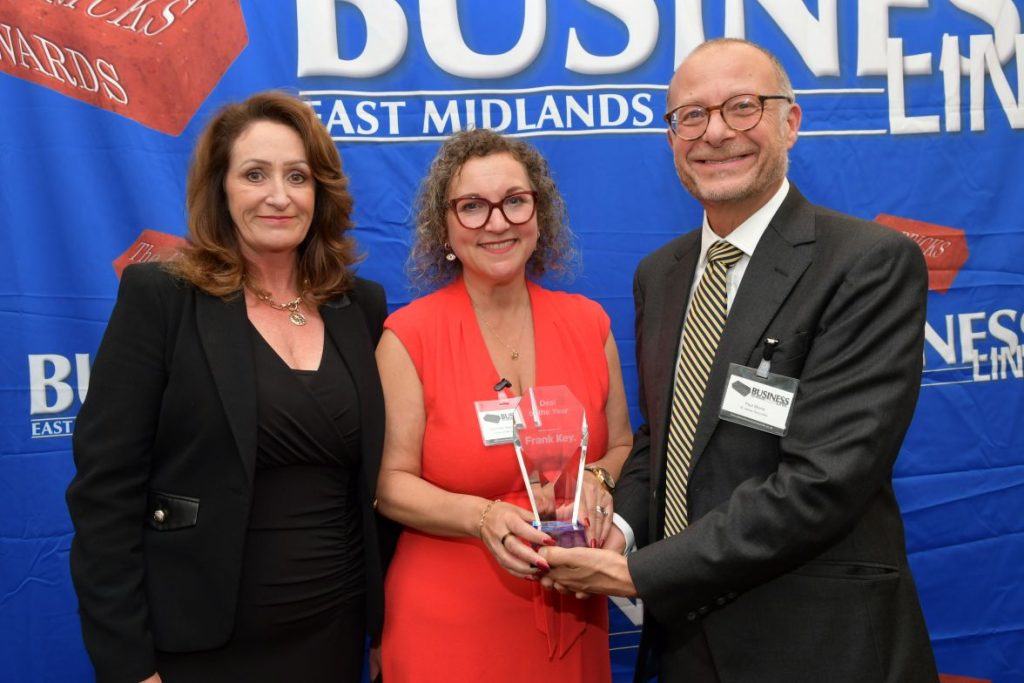
Deal of the Year – sponsored by Frank Key
Winner
Vaillant Live deal – St James Securities
Runners up
Built-to-rent deal at next phase of Derby Castleward regeneration – Lovell, Placefirst
Top Wighay deal – Vistry East Midlands

Residential Development of the Year – sponsored by Build Manager
Winner
Riber Castle – StudioTwenty
Runners up
Abbey Central – Stagfield Group & Peveril Homes
Prospect Place – TUNE

Commercial Development of the Year – sponsored by Global HSE Group
Winner
Canopy, Leicester – Henry Brothers
Runners up
Sherwood Observatory – G F Tomlinson
Homefield College SEND Building – Scope Construction
Vaillant Live – St James Securities
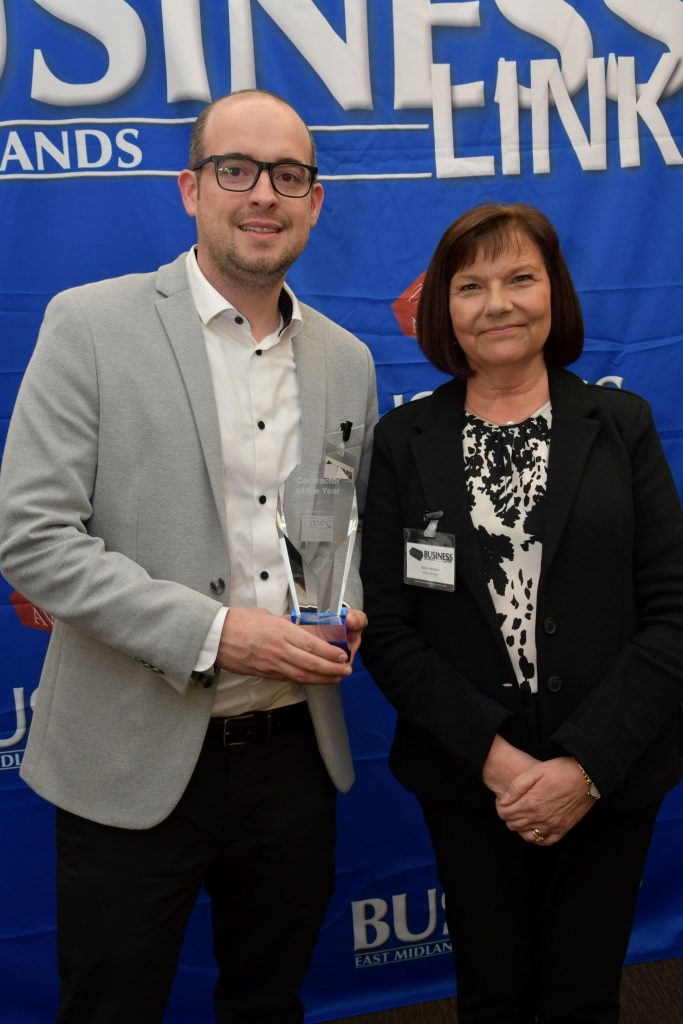
Contractor of the Year – sponsored by EMEC Ecology
Winner
Winvic Construction
Runners up
Goodward Construction
Miller Knight
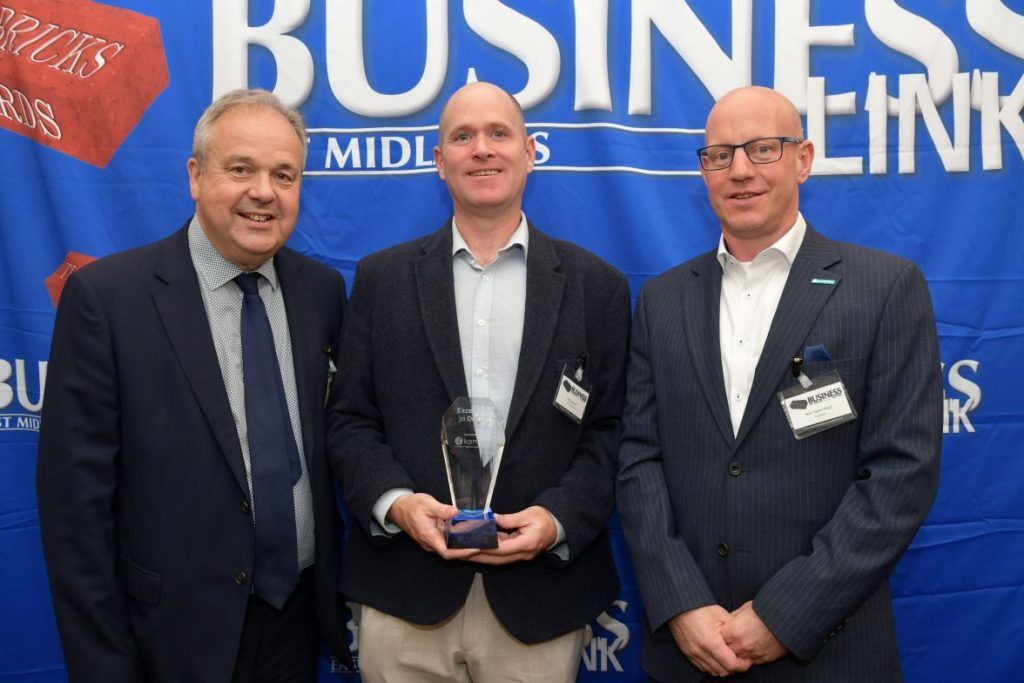
Excellence in Design – sponsored by Konsileo
Winner
Sutton on Sea Colonnade and Pleasure Gardens – G F Tomlinson
Runners up
Loughborough University DigiLabs Teaching Space – APSS
Vaillant Live – St James Securities

Most Active Agent – sponsored by Knapton Wright
Winner
Salloway Property Consultants
Runners up
OMEETO
Rigby & Co

Developer of the Year – sponsored by Devello
Winner
Clowes Developments
Runners up
St James Securities
Vistry East Midlands

Sustainable Development of the Year – sponsored by Viridis
Winner
Nottingham College Construction Skills Centre (CSC) and The Gateway – G F Tomlinson
Runners up
Evo Corby – PBBE Corby BV, PineBridge
Rykneld Homes North East Derbyshire retrofit – Coactivation
Abbey Central – Stagfield Group & Peveril Homes

Architects of the Year – sponsored by Roy Geddes Bricks
Winner
Church Lukas
Runners up
Morrison Design
Pelham Architects
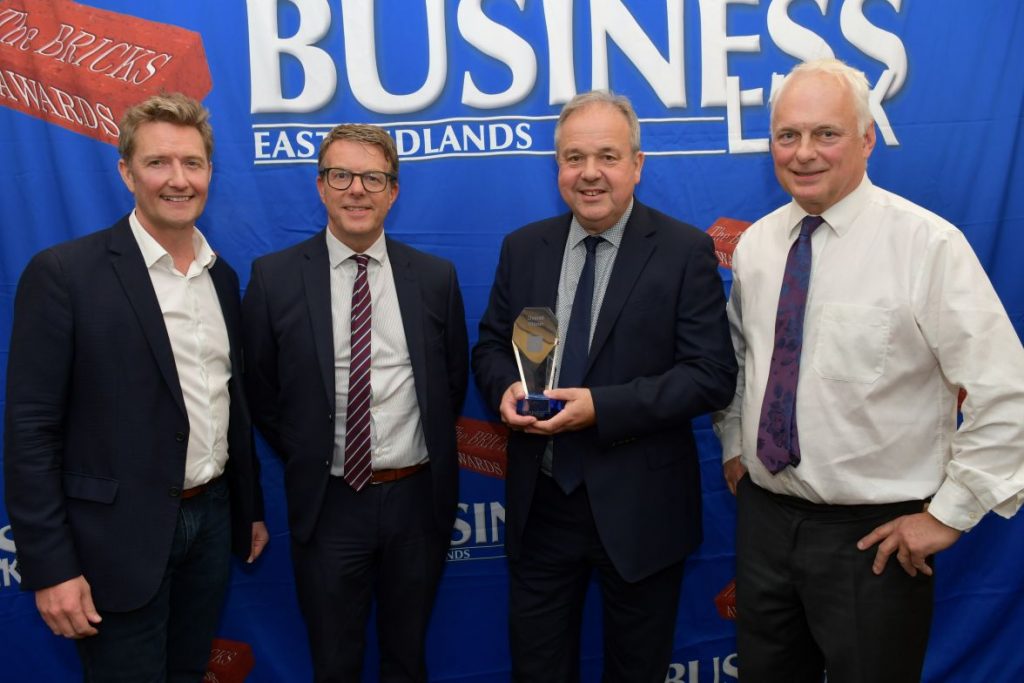
Overall Winner – sponsored by SEV
G F Tomlinson
To learn more about our finalists visit our showcase page!
See the event in the images below, taken by Richard Picksley.
Thanks to all our sponsors for supporting the East Midlands Bricks Awards 2025. Business Link Magazine looks forward to returning next year for the East Midlands Bricks Awards 2026!












Held at:

Chaiiwala delivers 35% growth to record global system sales of £90m
Key Principles appoints new joint managing directors
Key Principles has appointed Terri Foster and Malik Woodford as Joint Managing Directors, marking a leadership transition aimed at driving continued growth in the company’s digital marketing operations.
The Nottingham-based agency said the pair bring more than 19 years of combined experience to their new roles, reflecting an emphasis on continuity and long-term client relationships. Foster, who joined the firm in 2015, has a background in sales and marketing across the IT and logistics sectors and has specialised in paid media strategy. Woodford, who started with the company in 2017 after university, leads its SEO and web development functions.
Under their direction, the agency plans to strengthen its position in an evolving digital landscape, focusing on leveraging emerging technologies, including artificial intelligence, to enhance client outcomes.
“I am honoured by this opportunity to lead alongside Terri. Together, we’re committed to pushing the boundaries of what’s possible in digital marketing and helping our clients achieve unparalleled success,” said Malik Woodford.
Outgoing managing director Jackie Key will continue to support the leadership transition over the next two years, ensuring stability across operations. The firm said her ongoing involvement underlines confidence in the new management structure and its future direction.
Rhubarb Hospitality appointed to lead Island Quarter venues
The Island Quarter in Nottingham has appointed Rhubarb Hospitality Collection (RHC) to manage its key venues, Cleaver & Wake and Binks Yard, as part of plans to expand its hospitality and events offering.
The appointment marks a new phase of development for the 1 The Island Quarter site, which has become one of Nottingham’s most prominent destinations for dining, entertainment, and corporate events. RHC, known for operating major hospitality spaces such as Sky Garden and the Royal Albert Hall, will oversee day-to-day operations and further develop the venues’ brand presence.
The move was made by Conygar, the investment company behind the 36-acre mixed-use development, which aims to position the area as a leading leisure and business destination in the region.
Christopher Ware, managing director at Conygar, said: “Since launching Binks Yard and Cleaver & Wake in 2022, we have been welcomed to the Nottingham hospitality scene with an incredible reception, which has allowed us to continue to grow and develop. We now have a packed events calendar on the Binks Terrace and are a staple for corporate occasions and weddings at Upstairs at Cleaver & Wake.
“It’s a natural progression for us to elevate our offering by appointing an operator, and RHC’s experience is unparalleled. I look forward to working with the team to continue to bring our vision for the wider Island Quarter to life and provide a range of experiences for people in Nottinghamshire and beyond.”
RHC’s appointment is expected to strengthen the venues’ reputation within Nottingham’s business and leisure sectors, enhancing their appeal for corporate events, weddings, and large-scale functions. The operator’s international experience will also support future phases of The Island Quarter’s development.
New agreement sees Dr. Martens enter the UAE
Dr. Martens, the iconic Northamptonshire footwear brand, has secured a new distribution partnership agreement with Beside Group in the UAE, marking the brand’s entry into the UAE for the first time.
The brand has additionally partnered with Crosby in Latin America, which opened a store in Santiago, Chile last week – its second in the region following the opening of a store in Argentina in August.
These partnerships mark an important milestone in Dr. Martens’ next phase of growth, as part of the strategic objective of curating market-right distribution and entering new growth markets with capital-light models.
Ije Nwokorie, CEO of Dr. Martens, said: “These exciting partnerships are consistent with our strategy of entering new growth markets to reach more consumers than ever before through a capital-light approach. We see enormous potential for Dr. Martens in the UAE and Latin America and are delighted to have two partners who really understand both the depth and breadth of our iconic brand.”
Popular Nottingham city centre bar sold
Cubo sees record-breaking summer of growth
Derelict Derby factory to be redeveloped into film and stunt academy
A long-abandoned industrial site in Derby is set to be repurposed as a specialist training and film facility following the receipt of planning approval.
The former Aida Bliss ironworks on City Road, which has fallen into disrepair through vandalism and fire damage, will be transformed in phases. The first stage will see the newer warehouse converted into a gymnasium, performance studios, and a café. Later phases will create film set areas, stunt training zones, and acting spaces, followed by rehabilitation and gym facilities for athletes.
The development, backed by Damien Walters Ltd, will also provide a permanent home for Derby City Gymnastics Club. Walters, who has extensive credits in the international film industry, acquired the site from the council in 2023.
Architects leading the project emphasised that the external appearance of the heritage site will remain largely unchanged, preserving the city’s industrial history. Planning documents highlight the potential for the scheme to position Derby as a centre for film-making and gymnastics, while contributing to economic diversification and community benefit.
The staged redevelopment is designed to bring long-term value to the local economy, attract new investment and establish a sustainable use for a heritage asset.
Lithia expands UK presence with Hatfields deal
Lithia UK has completed the acquisition of Hatfields Group, finalised on 30 September 2025. The transaction covers four Land Rover dealerships and an OMODA JAECOO site, marking the group’s first move into the Chinese brand in Britain.
The deal takes Lithia UK’s Land Rover footprint to 11 locations, many also offering Jaguar services, with new coverage across Hull, Liverpool, Pickering, and Shrewsbury. The Hatfield operations will be integrated into Lithia’s Stratstone luxury and exotics division while continuing under the Hatfield’s name. Staff will remain in post.
The OMODA JAECOO dealership in Hull will join Lithia’s Evans Halshaw division, which already works with brands including BYD, Ford, and Vauxhall. This brings a new OEM partner into the portfolio at a time of growing interest in emerging global marques.
Hatfields, established in 1922, has a long-standing history with Jaguar Land Rover, including recent industry recognition. Lithia UK confirmed the move strengthens its representation of Jaguar and Land Rover’s full model range while broadening its geographic reach in the North of England.
Arup appointed to lead UK cement and lime decarbonisation project
Arup has been selected by Peak Cluster to oversee the Environmental Impact Assessment and technical documentation for the Development Consent Order on the UK’s largest cement and lime decarbonisation project.
The initiative targets a sector that produces 40% of the nation’s cement and lime across Derbyshire and Staffordshire. The industry supports more than 2,000 regional jobs but generates over 3 million tonnes of carbon dioxide annually, accounting for nearly a quarter of local emissions.
Peak Cluster’s plan involves building carbon capture plants at sites operated by Tarmac, Buxton Lime, Breedon and Holcim. Captured emissions will be transported through a proposed underground pipeline to Spirit Energy’s Morecambe Net Zero storage site, where permanent offshore storage is planned.
Arup will lead the environmental assessment and consent process, with AECOM and Quod providing additional expertise. The work will examine the environmental impacts of both the carbon capture facilities and the pipeline during construction and operation. It will also address integration with Spirit Energy’s offshore infrastructure.
Richard Lowe, Director of Energy Consenting and Development at Arup, commented: “We are delighted to be playing such a key role in the development of this transformative project, in which the UK National Wealth Fund have invested, and to build on our deep involvement from its earliest stages. Peak Cluster is working to secure a sustainable future for the UK cement and lime industry and act as a blueprint for similar developments across Europe and the rest of the world.”
The project is positioned as a blueprint for decarbonising heavy industry, supporting low-carbon product development and securing long-term industrial capacity in the UK.
Winners revealed: the East Midlands Bricks Awards 2025

Responsible Business of the Year – sponsored by Wright Vigar
Winner
G F Tomlinson
Runners up
Scope Construction
Morrison Design

Deal of the Year – sponsored by Frank Key
Winner
Vaillant Live deal – St James Securities
Runners up
Built-to-rent deal at next phase of Derby Castleward regeneration – Lovell, Placefirst
Top Wighay deal – Vistry East Midlands

Residential Development of the Year – sponsored by Build Manager
Winner
Riber Castle – StudioTwenty
Runners up
Abbey Central – Stagfield Group & Peveril Homes
Prospect Place – TUNE

Commercial Development of the Year – sponsored by Global HSE Group
Winner
Canopy, Leicester – Henry Brothers
Runners up
Sherwood Observatory – G F Tomlinson
Homefield College SEND Building – Scope Construction
Vaillant Live – St James Securities

Contractor of the Year – sponsored by EMEC Ecology
Winner
Winvic Construction
Runners up
Goodward Construction
Miller Knight

Excellence in Design – sponsored by Konsileo
Winner
Sutton on Sea Colonnade and Pleasure Gardens – G F Tomlinson
Runners up
Loughborough University DigiLabs Teaching Space – APSS
Vaillant Live – St James Securities

Most Active Agent – sponsored by Knapton Wright
Winner
Salloway Property Consultants
Runners up
OMEETO
Rigby & Co

Developer of the Year – sponsored by Devello
Winner
Clowes Developments
Runners up
St James Securities
Vistry East Midlands

Sustainable Development of the Year – sponsored by Viridis
Winner
Nottingham College Construction Skills Centre (CSC) and The Gateway – G F Tomlinson
Runners up
Evo Corby – PBBE Corby BV, PineBridge
Rykneld Homes North East Derbyshire retrofit – Coactivation
Abbey Central – Stagfield Group & Peveril Homes

Architects of the Year – sponsored by Roy Geddes Bricks
Winner
Church Lukas
Runners up
Morrison Design
Pelham Architects

Overall Winner – sponsored by SEV
G F Tomlinson
To learn more about our finalists visit our showcase page!
See the event in the images below, taken by Richard Picksley.
Thanks to all our sponsors for supporting the East Midlands Bricks Awards 2025. Business Link Magazine looks forward to returning next year for the East Midlands Bricks Awards 2026!












Held at:

Local construction industry ambassador returns to DIY SOS to support eight-year-old with rare condition
Newark Bypass upgrade moves forward with £500m approval
National Highways has secured planning consent for the £500m A46 Newark Bypass upgrade after the Secretary of State for Transport approved a Development Consent Order.
The scheme will widen 6.5km of road between Farndon and Winthorpe roundabouts near Newark-on-Trent. The single carriageway will be expanded into a dual carriageway, providing two lanes in each direction.
Funding for the project was confirmed following the Government’s Spending Review earlier this year. The bypass is a key section of the A46 corridor, which is heavily used for freight and regional connectivity across the East Midlands.
Work is expected to reduce congestion, improve journey reliability, and support long-term economic growth by strengthening one of the region’s most important transport routes.



